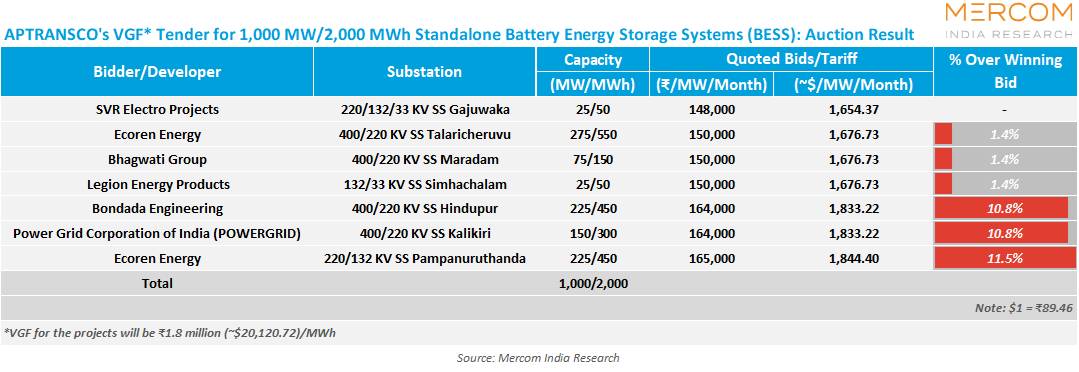Bondada, PGCIL Among Winners of APTRANSCO’s 2 GWh Standalone BESS Auction
The tender was floated in August 2025
November 28, 2025
Follow Mercom India on WhatsApp for exclusive updates on clean energy news and insights
Six companies have won Transmission Corporation of Andhra Pradesh’s (APTRANSCO) auction to develop 1,000 MW/2,000 MWh standalone battery energy storage systems (BESS) in the state.
Bondada Engineering won 225 MW for the project at Hindupur substation, and Power Grid of India (PGCIL) won 150 MW for the project at Kalikiri substation, both at a tariff of ₹164,000 (~$1,833.22)/MW/month.
Ecoren won 275 MW at a tariff of ₹150,000 (~$1,676.73)/MW/month for the project at Talaricheruvu substation and won 225 MW at a tariff of ₹165,000 (~$1,844.4)/MW/month for the project at Pampanuruthanda substation.
Bhagwati Group won 75 MW at a tariff of ₹150,000 (~$1,676.73)/MW/month for the project at Maradam substation.
Legion Energy Products won 25 MW at a tariff of ₹150,000 (~$1,676.73)/MW/month for the project at Simhachalam substation.
SVR Electro Projects won 25 MW at a tariff of ₹148,000 (~$1,654.37)/MW/month for the project at Gajuwaka substation.
The tender was floated in August 2025.
The projects will be developed under the build, own, and operate model through tariff-based competitive bidding, with support from viability gap funding (VGF). The VGF support available per project will be capped at ₹1.8 million (~$20,930.23)/MWh, disbursed in three tranches.
The project entails the development, operation, and maintenance of the standalone BESS projects at the designated substations. The projects must interconnect with the State Transmission Utility network at the 33 kV level.
The BESS must be set up for two operational cycles per day, with a minimum annual system availability of 95%.
The winners must ensure the BESS projects have a round-trip efficiency of at least 85%.
Winners will sign a 12-year battery energy storage project agreement from the date of the project’s commissioning.
The projects must be commissioned within 18 months from the effective date of the battery energy storage purchase agreement, with a permissible extension of up to six months.
The BESS must be capable of charging or discharging in blocks of either 50 MW/100 MWh or 75 MW/150 MWh, up to the total rated capacity at each project.
In September, the Andhra Pradesh Electricity Regulatory Commission introduced the Battery Energy Storage Systems Regulations, 2025, providing a clear framework for the deployment and integration of energy storage technologies in the state.
In the first half of 2025, India added 48.4 MWh of energy storage capacity, a 74% decline from 186 MWh added in the same period last year, according to the India’s Energy Storage Landscape 1H 2025 Report by Mercom India Research. India’s cumulative installed energy storage capacity reached 490 MWh by the end of June 2025.

